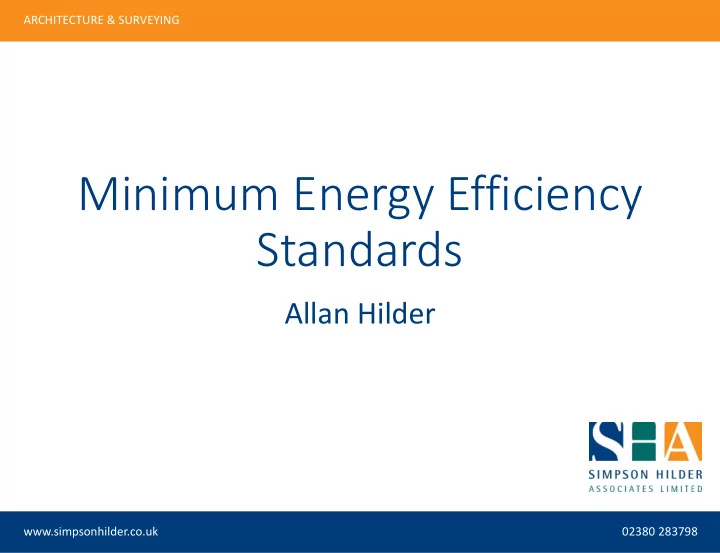

ARCHITECTURE & SURVEYING Minimum Energy Efficiency Standards Allan Hilder www.simpsonhilder.co.uk 02380 283798
ARCHITECTURE & SURVEYING Introduction New laws coming into effect from April 2018 which will affect the non domestic private rental sector. www.simpsonhilder.co.uk 02380 283798
ARCHITECTURE & SURVEYING Who will MEES apply to? All non-domestic properties will need to comply with the Minimum Energy Efficiency Standards. 1 April 2018 - The regulations will be enforced upon the granting of a new lease as well as lease renewals. 1 April 2023 - The regulations will apply to ALL privately rented property in scope of the regulations, including where a lease is already in place and a property is occupied. www.simpsonhilder.co.uk 02380 283798
ARCHITECTURE & SURVEYING Five Things You Need to Know 1. MEES (the Minimum Energy Efficiency Standards) are law now 2. It is estimated that up to 20% of non domestic properties in England and Wales could have an F or G rating 3. From April 2018 - The regulations will be enforced upon the granting of a new lease as well as lease renewals. 4. From April 2023 - The regulations will apply to all privately rented property in scope of the regulations, including where a lease is already in place and a property is occupied. 5. The government has declared their wish to raise those standards further such that the minimum standard is likely to rise to a D by 2025 and a C Rating in 2030 www.simpsonhilder.co.uk 02380 283798
ARCHITECTURE & SURVEYING What is the Minimum Energy Efficiency Standard (MEES)? • From April 2018 changes to legislation will make it unlawful to agree a new lease for a non domestic property with an (EPC) with a rating of below an E • Up to 20% of non domestic properties could have an EPC rating of an F or G, meaning that unless they were upgraded to meet the minimum standards it may become illegal to rent them. • The valuation of properties not meeting the standards will be affected, as their marketability will be diminished. • Rent reviews on F and G properties may be adversely affected • There may be implications for dilapidation assessments, where landlords have a legal responsibility to ensure the property is maintained to the standard agreed in the contract. • Financial penalties for non compliance will be linked to the rateable value of the property, but could be as much as £150,000! www.simpsonhilder.co.uk 02380 283798
ARCHITECTURE & SURVEYING Exemptions Landlords can be made exempt from MEES if they are able to demonstrate one of the following: • They have carried out all cost-effective energy efficiency improvements. • Measures Identified by Green Deal or an alternative Government scheme are not cost effective. The landlord will be exempt If energy efficiency improvements devalue the property (by 5% or more) or if improvements under such schemes fail to raise the EPC rating above an F. The Government is expected to launch a new scheme later in the year enabling landlords to improve the energy efficiency of their properties without the need for upfront costs. • If third-party consents are not available despite reasonable effort. www.simpsonhilder.co.uk 02380 283798
ARCHITECTURE & SURVEYING Exemptions Are any properties exempt? • Properties that do not require an EPC under current regulations will not be required to meet MEES (for example stand alone buildings less than 50m² ). Moreover MEES does not apply to short lettings (6 months or less) and lettings over 99 years or more. • Listed buildings may be exempt but guidance is currently unclear. • Not heating the premises may be the loophole! – But will severely restrict usage. • Non compliant premises will need to apply to be on the exemptions register. www.simpsonhilder.co.uk 02380 283798
ARCHITECTURE & SURVEYING What to do? • Initial EPC assessment. • Review and cost potential improvements. • Carry out improvement works. • New EPC. www.simpsonhilder.co.uk 02380 283798
ARCHITECTURE & SURVEYING What to do? NO Is the property required to have an EPC, and is it let on a Landlord may let the property tenancy? YES YES Does the EPC for the property demonstrate an energy Landlord may let the property efficiency of E or above? NO Landlord carries out all relevant energy efficiency YES improvements – where the property remains below an energy rating of E , Landlord registers this exemption on Landlord may let the property the PRS exemptions register. NO YES Landlord registers an exemption (consent/devaluation/new landlord) on the PRS Landlord may let the property exemptions register. NO Landlord MAY NOT let the property. If the landlord lets the property in breach of regulations s/he may be liable to enforcement action. www.simpsonhilder.co.uk 02380 283798
Recommend
More recommend